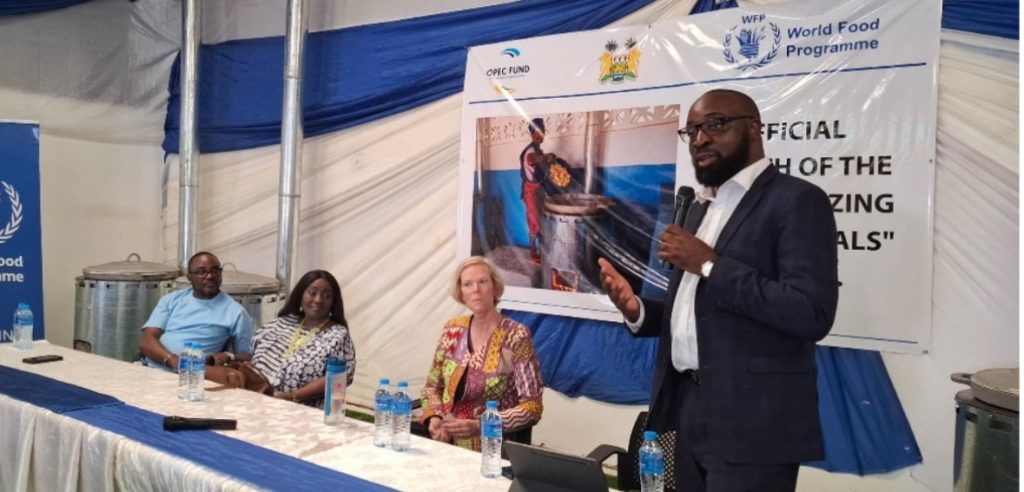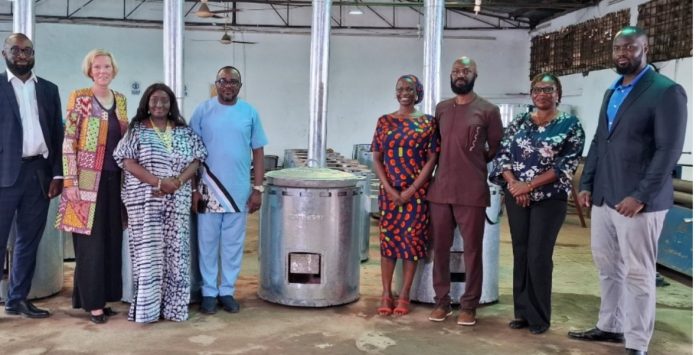AYV News, May 9, 2025
The World Food Programme (WFP), with funding from the OPEC Fund for International Development and in partnership with the Government of Sierra Leone, has officially launched the “Re-Energizing School Meals” project in Freetown. This initiative aims to enhance the sustainability and climate resilience of Sierra Leone’s National School Feeding Programme by introducing fuel-efficient stoves and establishing community woodlots across 440 schools in Pujehun, Kenema, and Kambia districts.

The project seeks to reduce firewood consumption for WFP school meals by over 2,600 metric tons annually, curbing deforestation and lowering harmful emissions. By replacing traditional stoves with energy-efficient alternatives, the initiative will also create a safer cooking environment for 1,300 volunteer women cooks, reducing their exposure to hazardous smoke. Over 110,000 school children will benefit from improved meal preparation while supporting Sierra Leone’s climate action goals.
Funded by a $1.2 million grant from the OPEC Fund, the project aligns with national efforts to promote climate-smart solutions in education and food security.
The official launch ceremony highlighted the strong partnership between WFP, the Government of Sierra Leone, and the OPEC Fund, emphasizing the project’s role in advancing education, health, and environmental sustainability.
By integrating climate smart technology and community woodlots, the project not only addresses immediate health and environmental concerns but also sets a precedent for sustainable development in school feeding programs nationwide.
Hon. Yeama Mimi Soba-Stephens, Deputy Minister of Environment and Climate Change, stated, “This initiative is a win for education, health, and the environment. We need to take smart steps that will help us deal with climate challenges and protect not only our environment but our very lives. It could be as simple as clean energy for which we are gathered here today”.
Joseph Lamin, Head of School Feeding Secretariate representing the Minister of Basic and Senior Secondary Education, stated, “In a world facing increasing challenges from climate change to environmental degradation, it is imperative that we address intertwined issues of food security, education and sustainability.” The implementation of this project he said would drastically reduce firewood consumption, combat deforestation and create a safer and healthier cooking environment for school children and cooks.
“We are proud to support this vital initiative that supports food security and energy solutions. This project in Sierra Leone is a test case for the West African region hoping to learn and share lessons and successes to other countries like Liberia. Our collaboration with WFP underscores our commitment to improving the lives of the most vulnerable communities.” stated Ijeoma Emenanjo, OPEC Fund Representative.
Expressing gratitude to OPEC Fund, Yvonne Forsen, Representative and Country Director of WFP Sierra Leone added, ” In partnership with the National School Feeding Programme, we are integrating this clean energy solution into a wider movement that connects food security, climate adaptation, gender equity, and child development. We are not adding a layer—we are building a foundation.” She reiterated that stoves are not just about cooking—they are about reducing the 2,600 tons of firewood that would otherwise be burned each year. They are about lowering carbon emissions and advancing Sierra Leone’s National Adaptation Plan, which calls for a 50% reduction in climate vulnerability by 2030.
Recounting her firsthand experience with the stoves, Memunatu Turay, a volunteer cook at the Holy Cross Roman Catholic Primary school in Rokuprr, Kambia district expressed that the cooking environment is not only smokefree but meal preparation is now faster.
With its multi-faceted benefits, the “Re-Energizing School Meals” project marks a significant milestone in Sierra Leone’s journey toward climate-smart development and inclusive growth.

